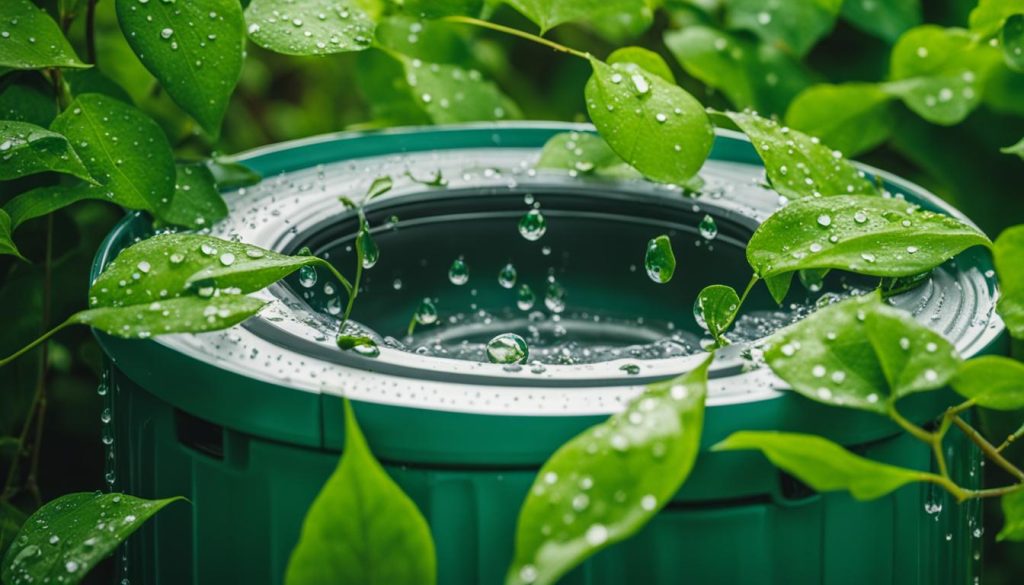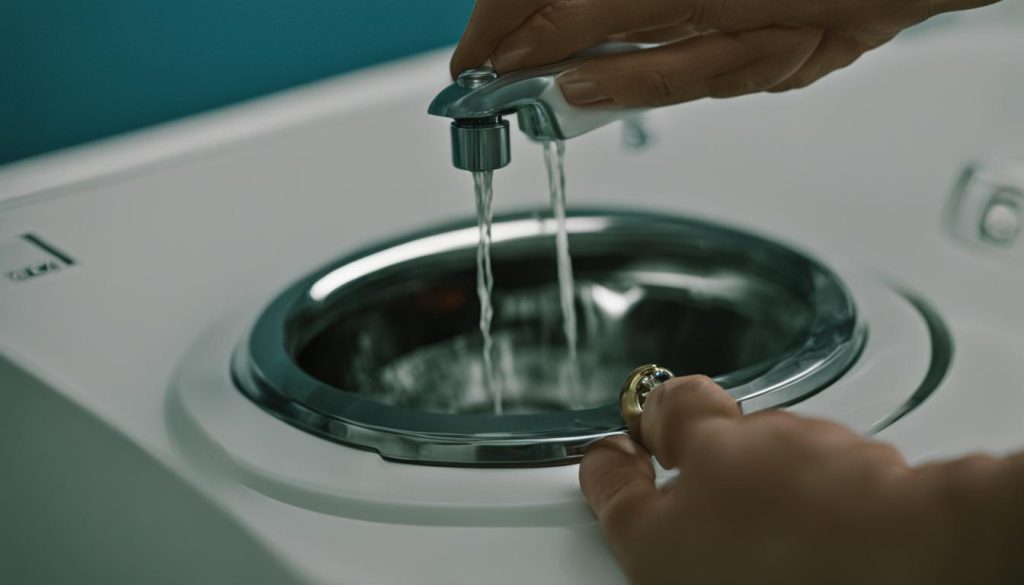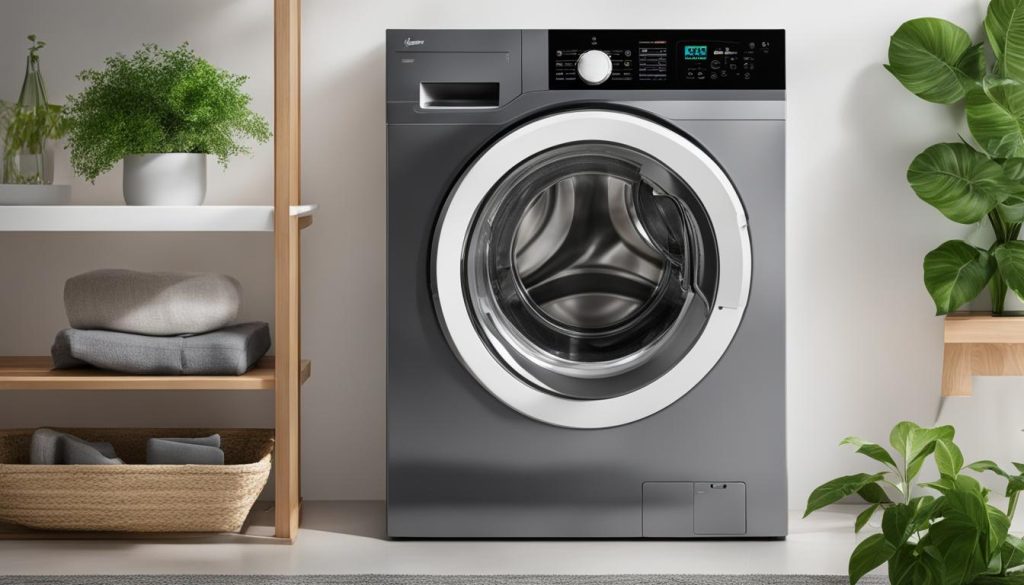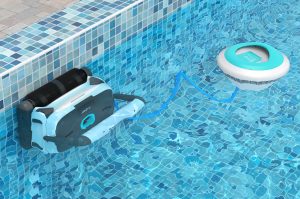If you’re conscious about conserving water and want to make informed choices when it comes to your washing machine, understanding how much water it uses is key. The amount of water a washing machine uses can vary depending on factors such as the type of machine and the specific load you’re washing.
A standard washing machine typically uses 19 or more gallons of water per load. However, high-efficiency (HE) machines are designed to clean clothes with just 7 gallons of water. By opting for an ENERGY STAR certified washer, you can save over 2,000 gallons of water annually for the average American family, as they use an average of 14 gallons of water per load.
HE machines are available in different models, including top-loading agitator, top-loading impeller, and front-loading models. These machines use specially formulated detergent for efficient cleaning with less water, ensuring your clothes come out fresh and clean.
Key Takeaways
- The amount of water a washing machine uses varies depending on the type of machine and the load size.
- Standard washing machines use 19 or more gallons of water per load, while HE machines use significantly less.
- ENERGY STAR-certified washers can save over 2,000 gallons of water annually for the average American family.
- HE machines are available in top-loading agitator, top-loading impeller, and front-loading models.
- These machines use specially formulated detergent for optimal cleaning with less water.
Washing Machine Water Usage Comparison
When it comes to water usage, the type of washing machine you have plays a significant role. Other factors such as the agitator or impeller, load size, and machine age also contribute to the amount of water consumed. Here’s a comparison chart to give you a general idea:
| Machine Type | Water Usage per Load |
|---|---|
| Top-load with agitator | 19-20 gallons |
| High-efficiency top-load | 14 gallons |
| High-efficiency front-load | 7 gallons |
It’s important to note that the water usage may also vary depending on the selected cycle and settings. While top-load washing machines with agitators tend to use more water, high-efficiency front-load machines are designed to be more water-efficient without compromising on cleaning power. Consider the specific needs of your household and laundry preferences when deciding on a washing machine.
How Water-Efficient Washers Work
Water-efficient washers are designed to minimize water usage while still effectively cleaning your clothes. They employ innovative technologies and features that allow them to optimize water levels based on the load size, resulting in significant water savings. Here’s how these washers operate:
- Load Size Detection: Water-efficient washers use advanced auto-sensors to detect the size of the load you’re washing. These sensors measure the weight or volume of the clothes and adjust the water level accordingly. This ensures that the washer doesn’t waste water when washing smaller loads and provides enough water for larger loads to ensure thorough cleaning.
- Optimal Water Level: Once the load size is determined, the washer adds the appropriate amount of water to achieve optimal cleaning results. This precise water level ensures that the clothes are adequately submerged in water for effective agitation and thorough cleaning, while still conserving water compared to traditional machines.
- Friction Cleaning: Water-efficient washers, particularly front-load and impeller models, rely on the clothes rubbing against each other to remove dirt and stains. The reduced water level in these washers allows for more friction between the fabrics, resulting in better cleaning performance. The rubbing action combined with the right amount of water creates an optimal wash action that efficiently removes dirt and grime.
- Concentrated Detergent: To further enhance water efficiency, these washers often recommend or require the use of concentrated detergents specifically designed for low water levels. These detergents are formulated to produce effective cleaning results even with reduced water usage. Using concentrated detergent helps avoid excessive suds and residue, ensuring that your clothes come out clean and fresh after every wash.
With their load size detection, optimized water levels, friction cleaning, and use of concentrated detergent, water-efficient washers offer an environmentally friendly and efficient solution for your laundry needs. They not only help conserve water but also provide excellent cleaning performance, making them a smart choice for any household.

How to Control Washing Machine Water Usage
To maximize water efficiency and conserve water when using a washing machine, follow these simple tips:
Select the Appropriate Wash Cycles
Choose the wash cycle that best suits your load. Some cycles, such as bulky or white fabric cycles, tend to use more water than others.
Adjust Rinse Settings
Use extra rinse settings only when necessary. Extra rinse settings can increase water usage, so make sure to activate them only for heavily soiled items or when you need an extra thorough rinse. For regular loads, stick to standard rinse settings to conserve water.
Pre-Treat Heavily Soiled Items
Pre-treating heavily soiled items can help reduce water usage during the wash cycle. Cold-soaking cloths, and using vinegar and baking soda solutions are some of the best options to try.
Wait for Full Loads
Waiting for a full load before running the washing machine is another effective way to control water usage. Running a full load ensures that you make the most efficient use of water for each cycle, reducing needless waste. If necessary, you can adjust the load size settings on your machine to accommodate smaller loads while still maintaining water efficiency.

Conclusion
Understanding the water usage of a washing machine is crucial in making an informed decision when purchasing a new appliance. High-efficiency washers are the preferred choice for those looking to conserve water and energy. These machines use less water during each cycle, contributing to significant savings on your water bill and reducing your environmental impact.
However, even if you have a conventional washing machine, there are simple tips you can follow to minimize water consumption.
Conserving water not only benefits your wallet and the planet, but it also promotes energy efficiency. As you seek to minimize water wastage, you’ll also discover that you’re using less energy to heat the water. Taking small steps towards efficient laundry practices can go a long way in preserving our precious natural resources and creating a sustainable future.
FAQ
What types of washing machines are available?
Washing machines are available in various types, including top-loading agitators, top-loading impellers, and front-loading models. High-efficiency (HE) machines are known for their water efficiency, using less water compared to other types.
How can I conserve water while using a washing machine?
To conserve water, opt for high-efficiency (HE) washers that use less water and energy. Additionally, choose appropriate wash cycles and adjust rinse settings based on your load. Pre-treating heavily soiled items and waiting for a full load before running the machine can further reduce water usage. Conserving water not only lowers your water bill but also contributes to environmental sustainability.






